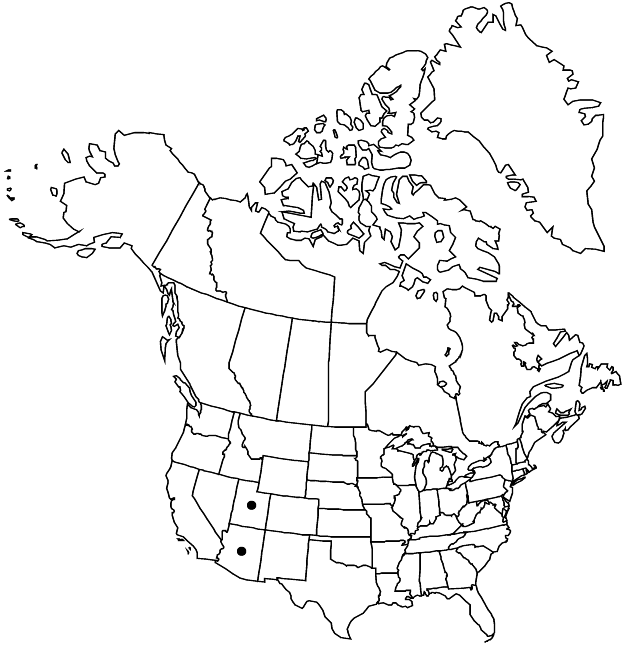Difference between revisions of "Eriogonum heermannii var. subspinosum"
Phytologia 86: 134. 2004.
FNA>Volume Importer |
FNA>Volume Importer |
||
| Line 24: | Line 24: | ||
|elevation=1000-2500 m | |elevation=1000-2500 m | ||
|distribution=Ariz.;Utah. | |distribution=Ariz.;Utah. | ||
| − | |discussion=<p>Variety subspinosum is known only from the southern end of the Beaver Dam Mountains in southern Washington County, Utah, and the eastern end of the Virgin Mountains and Virgin Narrows of Mohave County, Arizona. It approaches in habit the stoutly branched phase of var. argense known as var. subracemosum, but it lacks the papillate-scabrous condition. It also resembles var. sulcatum, but has only faintly grooved, rather than distinctly furrowed or deeply angled, inflorescence branches. It differs also in having the more open inflorescences of var. humilius. Both var. subspinosum and the subracemosum phase of var. argense have short, spinose lateral branches.</p> | + | |discussion=<p>Variety subspinosum is known only from the southern end of the Beaver Dam Mountains in southern Washington County, Utah, and the eastern end of the Virgin Mountains and Virgin Narrows of Mohave County, Arizona. It approaches in habit the stoutly branched phase of <i></i>var.<i> argense</i> known as var. subracemosum, but it lacks the papillate-scabrous condition. It also resembles <i></i>var.<i> sulcatum</i>, but has only faintly grooved, rather than distinctly furrowed or deeply angled, inflorescence branches. It differs also in having the more open inflorescences of <i></i>var.<i> humilius</i>. Both <i></i>var.<i> subspinosum</i> and the subracemosum phase of <i></i>var.<i> argense</i> have short, spinose lateral branches.</p> |
|tables= | |tables= | ||
|references= | |references= | ||
| Line 48: | Line 48: | ||
|publication year=2004 | |publication year=2004 | ||
|special status= | |special status= | ||
| − | |source xml=https://jpend@bitbucket.org/aafc-mbb/fna-data-curation.git/src/ | + | |source xml=https://jpend@bitbucket.org/aafc-mbb/fna-data-curation.git/src/8f726806613d60c220dc4493de13607dd3150896/coarse_grained_fna_xml/V5/V5_604.xml |
|subfamily=Polygonaceae subfam. Eriogonoideae | |subfamily=Polygonaceae subfam. Eriogonoideae | ||
|genus=Eriogonum | |genus=Eriogonum | ||
Revision as of 18:40, 18 September 2019
Shrubs, rounded, usually sparsely branched, 1–3 × 1.5–5 (–8) dm. Leaf blades lanceolate to narrowly elliptic or spatulate, 0.5–1.5 × 0.2–0.8 cm, thinly tomentose to floccose abaxially. Inflorescences 3–7(–10) × 3–10(–12) cm; branches usually diffuse, with dichotomously arranged involucres, stoutish, round, faintly grooved, glabrous, spinose. Involucres campanulate, 2–3 × 3–4 mm. Flowers 2.5–4 mm; perianth yellowish white.
Phenology: Flowering Mar–May.
Habitat: Limestone flats, washes, and slopes, saltbush and blackbrush communities
Elevation: 1000-2500 m
Discussion
Variety subspinosum is known only from the southern end of the Beaver Dam Mountains in southern Washington County, Utah, and the eastern end of the Virgin Mountains and Virgin Narrows of Mohave County, Arizona. It approaches in habit the stoutly branched phase of var. argense known as var. subracemosum, but it lacks the papillate-scabrous condition. It also resembles var. sulcatum, but has only faintly grooved, rather than distinctly furrowed or deeply angled, inflorescence branches. It differs also in having the more open inflorescences of var. humilius. Both var. subspinosum and the subracemosum phase of var. argense have short, spinose lateral branches.
Selected References
None.
